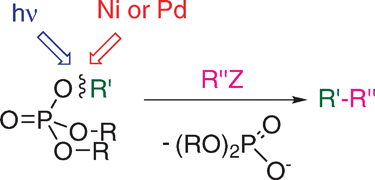Phosphate esters as “tunable” reagents in organic synthesis†
Abstract
The essential role phosphates have in biochemistry has no parallel in man-made chemistry, where the poor reactivity of these

* Corresponding authors
a
Department of Organic Chemistry, University of Pavia, Via Taramelli 10, Pavia, Italy
E-mail:
fagnoni@unipv.it
Fax: 0039-0382-987323
Tel: 0039-0382-987316
The essential role phosphates have in biochemistry has no parallel in man-made chemistry, where the poor reactivity of these

 Please wait while we load your content...
Something went wrong. Try again?
Please wait while we load your content...
Something went wrong. Try again?
S. Protti and M. Fagnoni, Chem. Commun., 2008, 3611 DOI: 10.1039/B801888J
To request permission to reproduce material from this article, please go to the Copyright Clearance Center request page.
If you are an author contributing to an RSC publication, you do not need to request permission provided correct acknowledgement is given.
If you are the author of this article, you do not need to request permission to reproduce figures and diagrams provided correct acknowledgement is given. If you want to reproduce the whole article in a third-party publication (excluding your thesis/dissertation for which permission is not required) please go to the Copyright Clearance Center request page.
Read more about how to correctly acknowledge RSC content.
 Fetching data from CrossRef.
Fetching data from CrossRef.
This may take some time to load.
Loading related content
